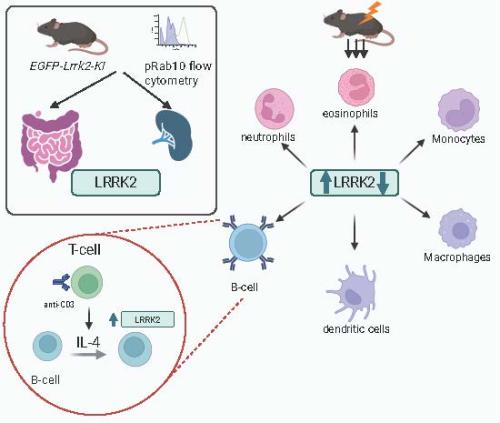
A new study from the Swamy lab has uncovered how inflammation and immune responses can regulate a key protein linked to both Parkinson’s disease and Crohn’s disease, providing crucial insights into how these very different conditions may share common roots.
The protein in question, LRRK2, is a kinase—an enzyme that modifies other proteins and is known to be involved in both brain and gut health. Mutations in the LRRK2 gene are the most common known genetic cause of Parkinson’s and are also associated with several inflammatory diseases, including Crohn’s. However, how LRRK2 behaves in the immune system was not well understood.
To address this, the researchers developed a sensitive new assay to measure LRRK2 activity in individual cells and engineered a novel mouse model to track LRRK2 expression. Using these tools, they discovered that inflammation strongly increases LRRK2 activity in specific immune cells like B cells and monocytes. Interestingly, a mutation commonly found in Parkinson’s disease further amplified this inflammatory response.
The team also identified interleukin-4 (IL-4)—a molecule released by activated T cells—as a powerful trigger for LRRK2 activity in B cells, pointing to a previously unrecognised immune pathway linking inflammation and LRRK2 regulation.
Senior author Dr Mahima Swamy said, “Our findings suggest that immune signals not only switch on LRRK2 but do so in very specific ways across different cell types. This could be key to understanding how inflammation contributes to neurodegenerative and gut diseases.”
This work not only sheds light on a shared molecular pathway between Parkinson’s and Crohn’s but also suggests that controlling LRRK2 activity in the immune system might offer new treatment strategies. This study was run in collaboration with the Alessi, Sammler and Howden labs at the University of Dundee.
The research is published in EMBO Reports. https://doi.org/10.1038/s44319-025-00473-x
The graphical abstract was created in Biorender.com by M. Swamy.

